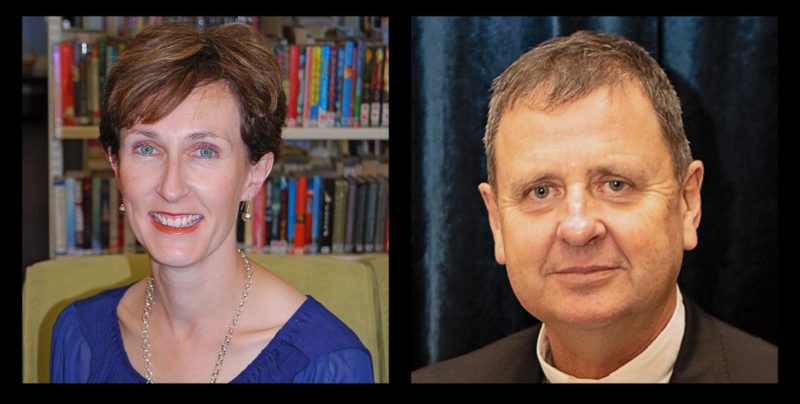New Zealand representatives at the Anglophone Safeguarding Conference in Rome said they want the Church’s safeguarding journey in New Zealand to be “a journey of conversion”.
New Zealand co-hosted the conference for the first time, upon the invitation of Ireland. The 2019 conference’s theme was “Formation”. Speakers from both countries shared experiences of forming a safe Church.
Presentations were given on forming safe parishes and communities; of safeguarding formation training for clerics, religious and Church leaders; of working to form children, young people and their parents and carers in faith development in safe environments; of ministering to survivors of abuse, and working with perpetrators of abuse.
Hamilton Bishop Stephen Lowe, who is responsible for the NZCBC’s national committee on professional standards and the National Director for Professional Standards, Virginia Noonan, were invited to speak about the New Zealand Church’s experience of forming parish communities.
In a statement sent to NZ Catholic, Bishop Lowe and Ms Noonan said they explained that the Church in New Zealand was at the beginning of its safeguarding journey.
“We wanted this to be a journey of conversion. The metaphor of the potter and the clay, (Jeremiah 18:1-6) was used to provide an understanding of formation as the action of shaping. Safeguarding formation should lead to the shaping and conversion of the whole person . . . and of every person in the parish. Their presentation drew on the necessity to provide clear human, spiritual, intellectual and pastoral dimensions to the formation, a formation that all people involved in ministry to children and vulnerable adults will need to do and that will be followed up with on-going formation,” the statement said.
The statement said they suggested that everyone has a role and a responsibility for this formation —parishioners; diocesan teams; parish leaders; religious and clergy; and bishops and superiors.
They used the Gospel passage of the disciples on the road to Emmaus as a metaphor of how to form parish communities.
“This involves understanding where parishes are in terms of their understanding of the importance of safeguarding formation, of listening to their experiences and practices and then accompanying in such a way to form best practice,” they said.
They encouraged the delegates in Rome “to think of what should a culture of safeguarding look like in a parish, and that safeguarding can’t simply be a matter of compliance”.
“At Emmaus, the disciples finally recognised Jesus and in the same way safeguarding formation should lead those . . . working with children and vulnerable adults to an ‘I get it!’ moment of recognition and enlightenment so they can become missionary disciples of safeguarding, who have eyes for better safeguarding practices in their own communities.”
Presentation
Paul Flanagan, senior lecturer within the post-graduate counsellor education programme at the University of Waikato, was also invited to present at the conference.
Mr Flanagan is also a member of the National Safeguarding and Professional Standards Committee for the New Zealand Catholic Church.
A particular focus of Mr Flanagan’s work has been supporting children and young people around abuse and sexuality issues. He had just completed his doctoral research in this area.
He spoke of the need to form children as healthy sexual beings and took the delegates through an exposition of different historical concepts of childhood.
Mr Flanagan then moved on to consider the formation of children.
“Paul reminded the participants that children are formed in and by family, in whatever form; in and by community, including parish, school etc., which may also be faith communities; and in and by the wider society, including national policies about children and their welfare, and extending to global influences, including international children’s policies,” the statement said.
The statement said Mr Flanagan referred to the myths and contradictions of sexuality education and childhood that have developed over time, and he spoke of the risks inherent in adults presuming childhood innocence about sex and sexuality. Mr Flanagan linked sexuality education to safeguarding, stating that safeguarding includes forming children as sexual beings. To achieve this, he explained the importance of supporting children in knowledge about their sexual selves — physically, socially, mentally and spiritually, and to support parents and teachers in their care of children to speak about sexuality as physical, social, mental and spiritual relationship.
Ms Noonan said the conference was well attended, with some 90 participants from 17 countries from all the continents. The agenda consisted of a number of speakers, opportunities for small group discussion, and the ability to feed back to members of the Pontifical Commission for the Protection of Minors, and the Vatican’s Congregation of the Doctrine of Faith.
The conference was based at the Pontifical Irish College, which allowed for daily Mass to be celebrated together, with use made of the conference facilities at the nearby Notre Dame Centre.
Ms Noonan commented that she was very grateful for the opportunity to engage in such excellent professional learning, with a number of initiatives to be introduced by her office in coming months to help strengthen current formation of both clergy and lay members of the Church in New Zealand.
The Anglophone conference brings together people from English-speaking nations who work in the Church’s implementation of child protection measures and in responding to abuse complaints. Since 2004, it has provided a forum for lay people, religious and provincials and bishops to share experiences, exchange ideas and to develop better practice.

Reader Interactions